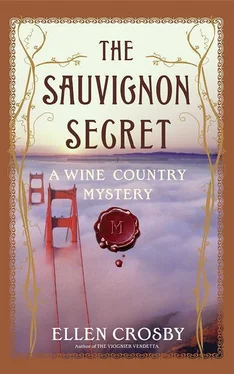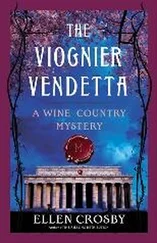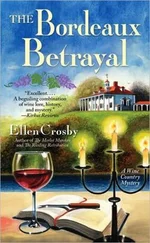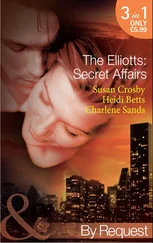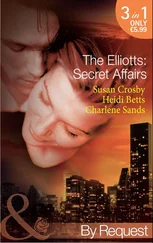“You were saying about your position with OSPR?” I asked. “Or DOSPR?”
Charles fixed his gaze on the fire. “I’m getting to that, what I did. R & D is the heart of playing what-if. You have conventional warfare—soldiers fighting each other on a battlefield—and then you have unconventional warfare,” he said. “Both are as old as time. People have been using some variant of biological and chemical weapons in wartime as far back as the ancient Greeks.”
Pépé sat up straighter in his chair. I’d been about to take a sip of my wine, but I stopped and uneasily waited for him to go on. Charles had changed the direction of this conversation with as much subtlety as shifting tectonic plates.
“Unconventional warfare took a different direction in the twentieth century, gassing troops in the trenches during the First World War to name one of the most graphic examples,” he said. “Then during World War II the use of airplanes to drop bombs that would cause widespread destruction took what-if to the next level. What if you could fill a bomb with some pathogen or crop agent and drop it over a city or farmland? You wouldn’t destroy buildings, but the damage would be incalculable. Think of how many people you could sicken or kill, wiping out food supplies for decades because you’d poisoned the soil, how paralyzing it would be to a country.”
He saw my eyes widen. “I’m not talking about the good guys, Lucie. Imagine the Nazis with that technology and you live in Paris or London in the 1940s knowing there’s a goddamn bull’s-eye painted on your back on a war room map in Berchtesgaden.”
“Go on, Charles,” Pépé said. “Lucie and I are listening.”
Charles sipped his wine. “Where was I? Oh, yes, the U.S. had its own programs—biological and chemical warfare—all conducted in the utmost secrecy. Then the war ended and things started to wind down. I’m going to fast-forward through some of this, but in the aftermath of the war there was a massive ethical and moral debate about whether to continue or abandon something so heinous, so reprehensible to the American psyche. That was what the politicians and civilian leaders wrestled with. So the military decided to move the program under its own tent, though by then we had field-tested the A-bomb and discovered that it worked.”
I was glad to hear the small note of irony in his voice.
“Weren’t plans for the atomic bomb drawn up at the Bohemian Grove?” Pépé asked.
“The Grove is rented out all the time to people who want to use it when the members aren’t there.” Charles sounded irritated and a little peevish. “It’s true there was a planning meeting held there for the Manhattan Project, which led, of course, to the A-bomb—but it wasn’t a plot concocted by the Bohemian Club, I can assure you.”
Pépé set his glass down on the table and reached for his cigarette pack. “I see.”
Charles shot him an inscrutable look. “Fortunately or unfortunately, depending on where you stood, the Cold War ramped up and that breathed new life into BW and CW research, saved the programs. We couldn’t afford to fall behind again.”
“You mean biological weapons and chemical weapons?” I said.
He nodded. “Some of it was run out of a small installation—Fort Wilton—just down the road in Maryland. We built on what was accomplished during the war: germ warfare, chemical warfare, plant and animal toxins, it’s a long list. But with any kind of research comes field testing. To be blunt, testing on animals only goes so far.”
He paused and now I was starting to guess where this was going.
“The Japanese did the most experimenting on human subjects during the war, and in return for us not prosecuting them for war crimes, we got a peek at their results. It was a Faustian pact, but it happened.” He shrugged. “Hell, we did our own testing here at home—open-air tests using simulants and then monitoring the results. No one knew at the time, of course. It wasn’t the sort of thing where you sent out permission slips door-to-door.”
I choked on my wine. “You’re talking about our government testing biological and chemical weapons on its own citizens?”
“Lucie, there were hearings on this in the late seventies. It is ancient history,” he said with the weariness of someone who had been over this ad nauseam and was tired of defending it. “We only did what was absolutely essential, took no unnecessary risks. You may have studied all this in your history books, my dear, but you’re forgetting these were the Cold War years when kids hid under their school desks during drills to prepare for a nuclear attack. It’s a cheap shot to look back and condemn; it was different living through those times.”
He got up and poured the last of the Margaux into our glasses.
“Charles, you took none for yourself,” Pépé said.
“I’m switching to brandy. Care to join me, anyone?”
“Non, merci,” my grandfather said, and I shook my head.
He walked behind the bar, setting a bottle of Rémy-Martin on the counter. “In 1969, Nixon bowed to ethical and moral pressure to stop the program. He signed orders that all chemical and biological weapons development and testing was to cease. They dismantled the lab at Wilton, let people go, moved equipment, animals, everything elsewhere.”
He splashed cognac into a snifter. “You can probably guess what I’m going to say next. A small group of biochemists, brilliant young scientists who’d been hired as contractors, thought it was insane to shut down our program when other countries were forging ahead.”
He came back to his chair, swirling the burnished liquid in his glass with the practiced ease of habit. I wondered why he wasn’t drunk yet. My own head was spinning. Writhing figures, like the sinewy one on my glass, danced in the flames of the fire and waved their arms.
Charles resumed his talk as he sat down. “It was easy enough to keep them off the grid. Wilton was the perfect place to do it. Plenty of other stuff went on that no one talked about. They were a tight-knit group, all good friends. They hadn’t wanted to split up anyway.”
“What did they do?” I asked.
“Mostly the same thing they’d been doing before.”
“Including experimenting on humans?”
“I’m getting to that,” he said. “Don’t rush me.”
Pépé caught my eye and made the universal gesture with one hand that meant Calm down .
“Sorry.”
“First you need to know about these young people,” Charles said. “Who they were. It’s important.”
Pépé nodded and exhaled a stream of smoke. I settled deeper into the cushions of the sofa.
“They used to get together on weekends after work. One of the girls’ families had a beach house on Pontiac Island in Maryland. Beautiful place, that island. Only a few hundred inhabitants. A two-lane bridge from the mainland and then you’re transported to another time where life moved more slowly. In the beginning it was idyllic.” A ghost of a smile flickered across his face.
“You, also, went to the beach house?” I asked.
“Once, for a birthday party, and one other time, but I didn’t socialize with them. There was a lot of drinking, weekends got a bit wild.” He paused, a distasteful expression on his face. “It led to some rather casual and open sexual activities, not my thing at all. Besides, I was married to my first wife.”
I waited for him to elaborate, but he didn’t.
“One of the girls, Maggie Hilliard, decided their little group needed a name—you know how girls are.” He gave me a tolerant smile and I bit my tongue, resisting the urge to ask him for his own interpretation of how girls were. “Some folderol invented one night when everyone was in their cups at the cottage. But it stuck. They called themselves the Mandrake Society.”
Читать дальше
